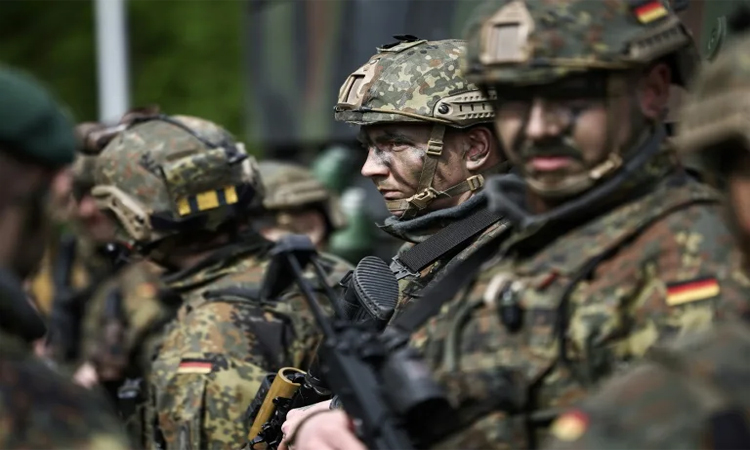News Flash
News Flash

FRANKFURT, Germany, March 27, 2025 (BSS/AFP) - In the midst of a blackout, rescuers rushed to the scene of an explosion, sirens wailing. A panic-stricken woman called out from inside a tram where some two dozen wounded citizens are trapped: "There are people bleeding!"
The emergency workers had to prise open the carriage doors to reach the victims, who were slumped against their seats and groaning in pain.
Luckily for everyone, the wounds were painted on with fake blood. The whole scene in the western German city of Frankfurt was a training exercise planned by the Malteser NGO and other aid organisations.
In all, some 125 volunteer rescuers were preparing to respond to a real crisis -- whenever it may come.
Germany, long secure within the US-led NATO alliance, has been increasingly troubled by the possibility of a large-scale emergency -- whether a military attack or a natural disaster -- within its borders since Russia's invasion of Ukraine.
US President Donald Trump's recent threats to withdraw security guarantees from Europe have added urgency to the efforts to ready for the worst possible scenario after decades of under-investment in defence.
The incoming government under chancellor-in-waiting Friedrich Merz has primed a spending "bazooka" worth hundreds of billions of euros, not only on the military but also infrastructure and civil protection.
"People need to prepare mentally and practically for disasters, storms, power outages or the outbreak of war," said Jan Krebs, 28, drill coordinator for the Malteser humanitarian relief agency.
The preparation exercise does not assume the cause of the emergency, but the idea that a city like Frankfurt, a major financial centre and transport hub, could be targeted by sabotage or a cyber attack was "a scenario you can imagine", said Krebs.
- 'Significant investments' -
Germany last week approved changes to its constitutional limits on new debt to allow virtually unlimited defence spending -- some of which will be destined for efforts to improve civil protection.
On the home front, the interior ministry calculated that around 30 billion euros ($32 billion) is needed to effectively protect the population in the
event of war, Der Spiegel magazine reported.
State-managed disaster relief agencies need cash to recruit new personnel and build logistics centres to distribute supplies in an emergency, the ministry argued in a memo.
A ministry spokesman declined to comment on the report but told AFP that "significant investments" were needed to improve civil protection.
Germany also needed to improve its facilities for ensuring a supply of safe drinking water and to warn the population of impending dangers, the ministry reportedly said.
Work is already underway. Sirens dismantled after the end of the Cold War are being reinstalled across the country.
And while most of Germany's WWII and Cold War era air-raid bunkers were similarly left to rot, the ministry has set about logging potential shelters and hopes to offer a mobile app to guide civilians to greater safety.
Calls have also gone out to prepare hospitals to handle hundreds of war-wounded a day in an eventual crisis, and for the government to build
underground facilities that could operate during an attack.
- 'Operation Germany' -
In parallel, officials have drawn up a comprehensive defence strategy, known as "Operation Germany", according to the armed forces.
As well as plans for mobilising troops and protecting critical infrastructure, the document -- the details of which are classified -- lays out the role to be played by civilian organisations, such as the Malteser.
The international group has around 10,000 trained volunteers in Germany but finding enough recruits was still the "biggest problem", especially among young people, said Krebs, who works in facility management when not helping out.
After decades of peace, "there are now generations who have absolutely no idea what the term 'war' means", he said.
Greater investments in "modern technology and good facilities" for rescuers would bring in volunteers, he said.
Stepped-up efforts were also needed to raise awareness among civilians about possibile emergencies and what to do to "help themselves", he said.
That included preparing a checklist of supplies to keep at home in case of an emergency, including stocks of water, food and medicine.
"Most people really haven't even noticed and are feeling relatively safe," said Daniela Marten, 60, who played one of the wounded in the exercise.
With fake blood dripping from her hands and face, Marten said she had begun following government advice to stock enough provisions to last two weeks but was trying to avoid unnecessary panic.
"I'm just trying to live a normal life and not drive myself completely crazy."